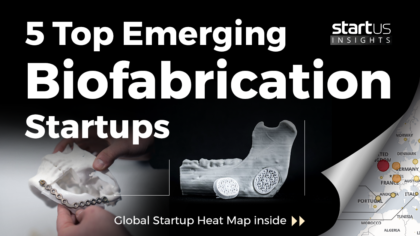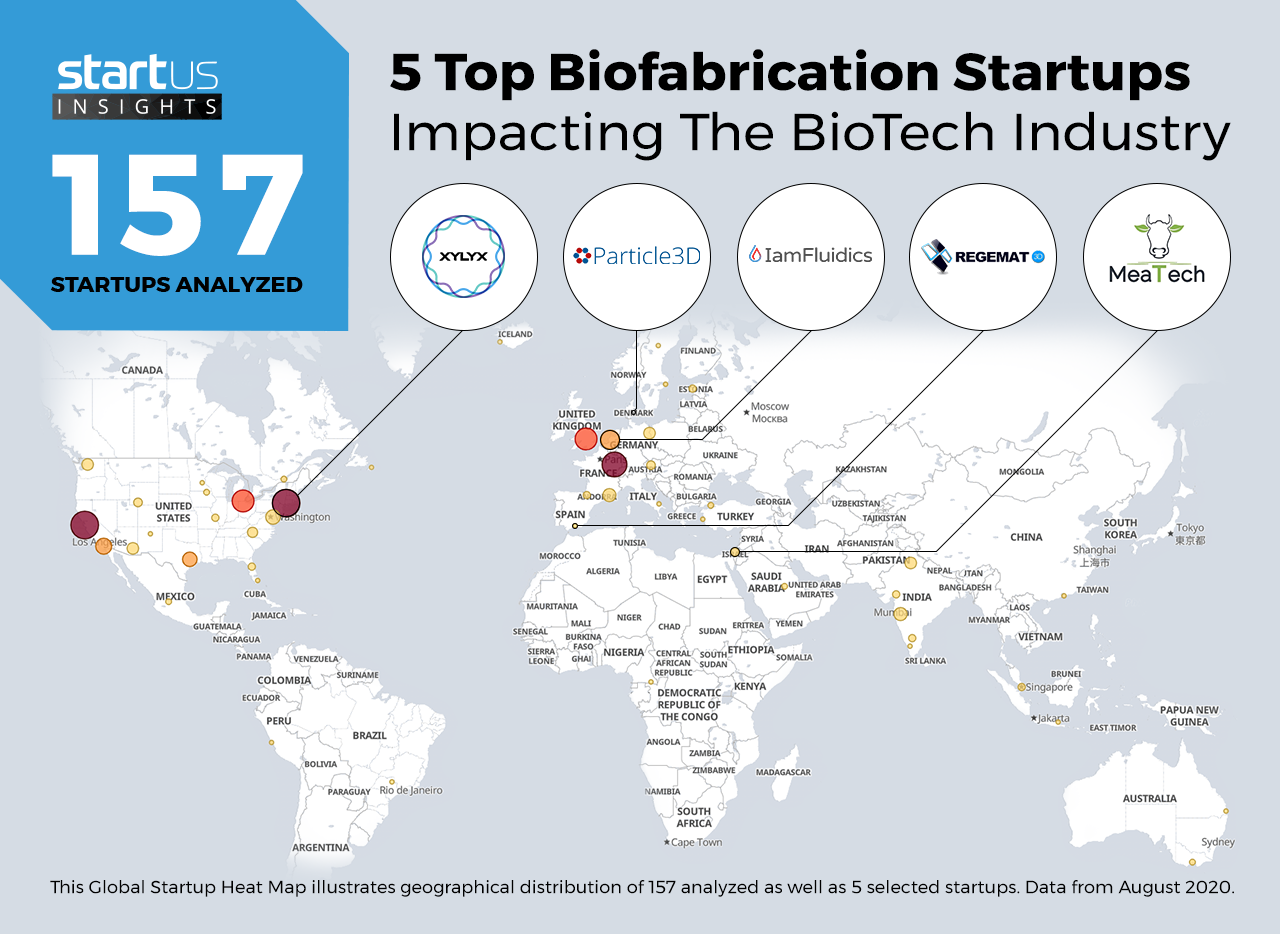Our Innovation Analysts recently looked into emerging technologies and up-and-coming startups working on solutions for the biotech sector. As there is a large number of startups working on a wide variety of solutions, we want to share our insights with you. This time, we are taking a look at 5 promising biofabrication startups.
Heat Map: 5 Top Biofabrication Startups
Using our StartUs Insights Platform, covering 1.116.000+ startups & emerging companies, we looked at innovation in the field of biotechnology. For this research, we identified 157 relevant solutions and picked 5 to showcase below. These companies were chosen based on a data-driven startup scouting approach, taking into account factors such as location, founding year, and technology among others. Depending on your specific criteria, the top picks might look entirely different.
The Global Startup Heat Map below highlights 5 startups & emerging companies developing biofabrication solutions. Moreover, the Heat Map reveals regions that observe a high startup activity and illustrates the geographic distribution of all 157 companies we analyzed for this specific topic.
Xylyx Bio – 3D Cell Culture
Growing cells in two dimensional (2D) cultures, though useful for a lot of applications, does not meet the needs of biofabrication. Three dimensional (3D) cell culture allows the growth of cells in all dimensions, allowing structures that are more realistic. By mimicking the environmental conditions of cells in biological structures, startups are advancing biofabrication to manufacture physiologically relevant solutions.
The US-based startup Xylyx Bio develops extracellular matrix (ECM) substrates for 3D cell culture. The tissue and disease-specific substrates contain all proteins and growth factors present in the native cell environment. Additionally, the ECM substrates provide ideal conditions for maintaining cell phenotype for more physiologically relevant results. The startup provides solutions for surface coatings, 3D hydrogels, and 3D scaffolds.
Regemat 3D – Bioprinting
Bioprinting combines biofabrication and additive manufacturing to print tissues and organs. The process involves the use of bioinks composed of cells and biomaterials such as hydrogels or other polymers. Bioprinting has multiple applications in pharmaceutical research and regenerative medicine.
Spanish startup Regemat 3D provides bioprinting solutions for regenerative medicine. With the help of fused deposition modeling (FDM), the startup enables the fabrication of scaffolds with complex external structures and meshed internal structures. The solution is further optimized for multiple tissue types and different biomaterials.
Particle3D – Bone Implants
Other than whole tissues and organs, biotech startups also bio-fabricate implants or other biocompatible medical materials. These often have the ability to perform biological functions or are eventually assimilated into the body. In orthopedics, bio-fabricated implants monitor and regulate the bone tissue and restore it back to its normal structure.
Danish startup Particle3D manufactures patient-specific bone implants. The startup develops a bioink comprising of a fatty acid matrix that enables a new additive manufacturing process to produce porous ceramic 3D structures. The startup’s solution finds applications in bone research as well as bone reconstruction. Particle3D’s implants have high mechanical strength and are contaminant-free.
MeaTech – Cell-Based Meat
In recent years, there has been increased scrutiny of the ethical and environmental considerations of meat production. Plant-based and cell-based meat alternatives address these issues. However, artificial meat needs to be as similar as possible to actual meat to convince consumers to make the switch. Biotech startups are advancing biofabrication technologies, such as tissue engineering, to make cell-based meat economically viable.
Israeli startup MeaTech uses biofabrication to produce cell-based meat. The startup produces a cell line from umbilical cord samples and then differentiates it into inks with different cell types. MeaTech uses 3D printing with cell type inks to create the base for cell-based meat and then allows it to mature in incubators.
IamFluidics – Microfabrication
Microfabrication takes fabrication to miniature levels, with structures of the microscale or even smaller. In biotech, microfabrication involves microfluidics-based solutions such as biochips using microelectromechanical systems (Bio-MEMS) and organ-on-a-chip systems. These solutions open up multiple applications, particularly in industrial production and diagnostics.
Dutch startup IamFluidics produces microparticles for industrial-scale production. The startup uses scalable novel microfluidic technologies to provide monodisperse hydrogel microparticles from alginate, a substance derived from brown algae. The size and concentration of the microparticles are customizable for different applications.
What About The Other 152 Solutions?
While we believe data is key to creating insights it can be easy to be overwhelmed by it. Our ambition is to create a comprehensive overview and provide actionable innovation intelligence so you can achieve your goals faster. The 5 biofabrication startups showcased above are promising examples out of 157 we analyzed for this article. To identify the most relevant solutions based on your specific criteria, get in touch.









